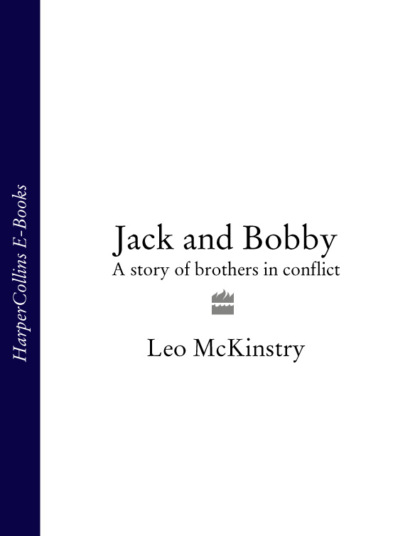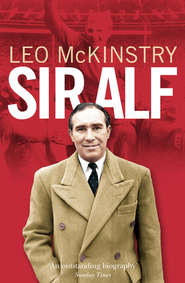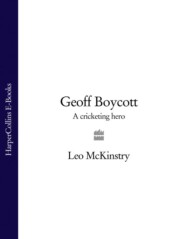По всем вопросам обращайтесь на: info@litportal.ru
(©) 2003-2024.
✖
Jack and Bobby: A story of brothers in conflict
Настройки чтения
Размер шрифта
Высота строк
Поля
Jack and Bobby: A story of brothers in conflict
Leo McKinstry
The history of modern British football can largely be written through the stories of Jack and Bobby Charlton. Both were in the World Cup winning team of ‘66, and each has remained deeply involved in the game ever since.The book traces the parallel lives of Jack and Bobby Charlton, following them from their schooldays through to the present day.The brothers both played prominent roles in the finest hour of English football, the 1966 World Cup triumph. Each played for the dominant club of their era, and summed up the style of their respective teams.Bobby was at Manchester Utd during their glory days under Sir Matt Busby. He survived the Munich air crash and went on to become a fast, graceful attacker who set grounds alight with his power, speed and athleticism in a team that played free-flowing, attacking football.Jack came to professional football late, working in a coal mine before Leeds signed him. Don Revie’s Leeds side was renowned for its uncompromising and physical style, and Jack was himself a tough, durable and aggressive defender, who once caused uproar by admitting he had a ‘black book’ with a list of footballing enemies who he would target on the pitch.The two retired from football in the same year, and since, the contrast between them has been marked. Bobby’s forays into management at Wigan and Preston were distinguished only by their brevity, while ‘Big Jack’ took the Republic of Ireland team to an unprecendented level of success, reaching the quarter finals of the World Cup in 1994. Bobby has been a key figure in the ongoing success of Manchester United over the past decade, working on recruiting players and as an FA diplomat.But, despite their continued successes, the relationship between the two has been strained, sometimes barely even polite, and the book will investigate the reasons for this, including in-depth interviews with many of those the two have been in contact with over the years.Note that it has not been possible to include the same picture content that appeared in the original print version.
JACK&BOBBY
Leo McKinstry
To James Perry,
whose devotion to Torquay United should have
resulted in a long spell in Broadmoor
Contents
Cover (#u7d2bb7e9-d23f-5ecd-b3b7-02d915cebcbc)
Title Page (#u638c3b01-7873-5dd5-9754-5dffd89d4caf)
Introduction (#ulink_d5f17913-b17c-54bb-99b6-bded0221e00a)
CHAPTER ONE: The Boys (#ulink_ff0bbe25-a230-57d6-b17e-9e9982b4bbcf)
CHAPTER TWO: The Migrants (#ulink_fdbd19b5-6b6f-57ad-a832-27f24135d1a7)
CHAPTER THREE: The Rebel (#ulink_0ea1ba33-f294-5720-9f64-3433883c7f86)
CHAPTER FOUR: The Conformist (#ulink_f2735538-0837-5c62-bb01-6006077ba8fd)
CHAPTER FIVE: The Victim (#ulink_219b32c3-d2f0-5a5e-b8f1-c199a4ba148f)
CHAPTER SIX: The Survivor (#ulink_d7af3429-6f40-5b44-8da7-9bdd4437a8ca)
CHAPTER SEVEN: The Bighead (#ulink_ef0457e6-0275-5bb8-a4db-5b9089b7d58a)
CHAPTER EIGHT: The Winger (#litres_trial_promo)
CHAPTER NINE: The Husbands (#litres_trial_promo)
CHAPTER TEN: The Internationals (#litres_trial_promo)
CHAPTER ELEVEN: The Winners (#litres_trial_promo)
CHAPTER TWELVE: The Players (#litres_trial_promo)
CHAPTER THIRTEEN: The Rivals (#litres_trial_promo)
CHAPTER FOURTEEN: The Losers (#litres_trial_promo)
CHAPTER FIFTEEN: The Outcast (#litres_trial_promo)
CHAPTER SIXTEEN: The Seniors (#litres_trial_promo)
CHAPTER SEVENTEEN: The Managers (#litres_trial_promo)
CHAPTER EIGHTEEN: The Eccentric (#litres_trial_promo)
CHAPTER NINETEEN: The Failure (#litres_trial_promo)
CHAPTER TWENTY: The Director (#litres_trial_promo)
CHAPTER TWENTY-ONE: The Irishman (#litres_trial_promo)
CHAPTER TWENTY-TWO: The Saint (#litres_trial_promo)
CHAPTER TWENTY-THREE: The Sons (#litres_trial_promo)
CHAPTER TWENTY-FOUR: The Millionaires (#litres_trial_promo)
Epilogue (#litres_trial_promo)
Career Appendix (#litres_trial_promo)
Bibliography (#litres_trial_promo)
Acknowledgements (#litres_trial_promo)
Index (#litres_trial_promo)
About the Author (#litres_trial_promo)
Praise (#litres_trial_promo)
Copyright (#litres_trial_promo)
About the Publisher (#litres_trial_promo)
Introduction (#ulink_a1f0428f-b35f-5091-a78e-40ce92bf47a9)
The images of that Saturday afternoon in July 1966 have become forever ingrained on our national consciousness: Jack Charlton falling to his knees at the final whistle, his face buried in his hands as if in grateful, exhausted prayer; his brother Bobby crying freely as he climbs up to the Royal Box to collect his World Cup winner’s medal. It was a display of emotion that perfectly captured the mood of triumph and relief that swept across the country.
‘Nobody can ever take this moment away from us,’ said Bobby to his brother as they hugged each other at the end of the match. He was absolutely correct. Whatever else they have achieved in life, the two Charlton brothers will always be best remembered for their part in England’s glory of 1966. Indeed, their contrasting roles on the field symbolized the virtues of England’s performance during that unique campaign: Jack, the rock of the defence, ungainly but uncompromising, lacking sophistication but never valour, as tough and honest as the mining stock into which he was born; Bobby, the fulcrum of the attack, gliding across the turf like a thoroughbred, destroying opponents with his explosive goals, long-range passes and incisive runs. Never, it seemed, were there two more patriotic footballers, willing, in Churchill’s phrase, to give ‘blood, toil, tears and sweat’ in the national cause.
The bond between the brothers, forged at birth and reinforced by their mutual choice of a career in football, must have seemed unbreakable that day at Wembley. Any belief that they were close to each other can only have been strengthened by a host of other striking parallels about their lives. Both played the game obsessively in their youth and turned out for the same local YMCA side. Both joined major city clubs, Leeds and Manchester United, at exactly the same age, 15, and each won a cabinet-full of domestic honours. In 1965, they became the first brothers this century to play together for England. The links continued after the triumph of 1966. Both retired from First Division football in the same year, after careers of outstanding loyalty – each holds the League appearance record for their club, Jack with 629 for Leeds, Bobby with 606 for Manchester United. Both started in League management in the same 1973/74 season in the Second Division. Later, they both became major figures on the international stage, Jack as a brilliantly successful manager of the Republic of Ireland, Bobby as a roving ambassador for top-class sports bids, such as the campaign to bring the 2006 World Cup to England.
Brought up in a close-knit working-class mining community where the values of respectability were paramount, both have led lives of restraint and dignity. Given their celebrity status – Jimmy Hill once described Bobby, not unjustly, as ‘the most famous Englishman in the world’ – it would have been easy for either of them to have fallen into the destructive pattern of heavy drinking, financial chaos and private dissolution that has characterized the lives of too many sporting greats, such as George Best, James Hunt or Denis Compton. Yet there has never been a whiff of scandal about their personal lives, both of them enjoying remarkably strong, happy marriages, as well as becoming millionaires through football and business. As John Giles, of Leeds, Manchester United and Ireland, put it to me: ‘I think Bobby and Jack have been great ambassadors for both football and for working-class England, because they have always behaved impeccably throughout their careers, handling fame and fortune in a way that most people could not begin to comprehend. They have never put a foot wrong, never become big-headed or gone astray. There is an underlying decency about them which stems from that background.’
That spirit of honour extended to football, where they were seen by most of their colleagues as hard-working professionals, fiercely competitive by nature, who would never let their side down. ‘The great thing about Jack,’ says his former Leeds colleague Willie Bell, ‘was that he would absolutely never give up. I have seen Jack with blood running down his face and, even then, he would not come off the field. He would never surrender, even when we were down, and that attitude rubbed off on the rest of the team. He was just a great professional.’ It is a view echoed by David Harvey, the Leeds and Scotland goalkeeper, who told me: ‘It was very reassuring to have Jack in front of me. He was a bit of a Godfather, looking after me really well. He was so commanding, always shouting at the rest of us and organizing the defence like a military policeman. He always played to such a high standard. His consistency was first class, no matter what the occasion.’
Leo McKinstry
The history of modern British football can largely be written through the stories of Jack and Bobby Charlton. Both were in the World Cup winning team of ‘66, and each has remained deeply involved in the game ever since.The book traces the parallel lives of Jack and Bobby Charlton, following them from their schooldays through to the present day.The brothers both played prominent roles in the finest hour of English football, the 1966 World Cup triumph. Each played for the dominant club of their era, and summed up the style of their respective teams.Bobby was at Manchester Utd during their glory days under Sir Matt Busby. He survived the Munich air crash and went on to become a fast, graceful attacker who set grounds alight with his power, speed and athleticism in a team that played free-flowing, attacking football.Jack came to professional football late, working in a coal mine before Leeds signed him. Don Revie’s Leeds side was renowned for its uncompromising and physical style, and Jack was himself a tough, durable and aggressive defender, who once caused uproar by admitting he had a ‘black book’ with a list of footballing enemies who he would target on the pitch.The two retired from football in the same year, and since, the contrast between them has been marked. Bobby’s forays into management at Wigan and Preston were distinguished only by their brevity, while ‘Big Jack’ took the Republic of Ireland team to an unprecendented level of success, reaching the quarter finals of the World Cup in 1994. Bobby has been a key figure in the ongoing success of Manchester United over the past decade, working on recruiting players and as an FA diplomat.But, despite their continued successes, the relationship between the two has been strained, sometimes barely even polite, and the book will investigate the reasons for this, including in-depth interviews with many of those the two have been in contact with over the years.Note that it has not been possible to include the same picture content that appeared in the original print version.
JACK&BOBBY
Leo McKinstry
To James Perry,
whose devotion to Torquay United should have
resulted in a long spell in Broadmoor
Contents
Cover (#u7d2bb7e9-d23f-5ecd-b3b7-02d915cebcbc)
Title Page (#u638c3b01-7873-5dd5-9754-5dffd89d4caf)
Introduction (#ulink_d5f17913-b17c-54bb-99b6-bded0221e00a)
CHAPTER ONE: The Boys (#ulink_ff0bbe25-a230-57d6-b17e-9e9982b4bbcf)
CHAPTER TWO: The Migrants (#ulink_fdbd19b5-6b6f-57ad-a832-27f24135d1a7)
CHAPTER THREE: The Rebel (#ulink_0ea1ba33-f294-5720-9f64-3433883c7f86)
CHAPTER FOUR: The Conformist (#ulink_f2735538-0837-5c62-bb01-6006077ba8fd)
CHAPTER FIVE: The Victim (#ulink_219b32c3-d2f0-5a5e-b8f1-c199a4ba148f)
CHAPTER SIX: The Survivor (#ulink_d7af3429-6f40-5b44-8da7-9bdd4437a8ca)
CHAPTER SEVEN: The Bighead (#ulink_ef0457e6-0275-5bb8-a4db-5b9089b7d58a)
CHAPTER EIGHT: The Winger (#litres_trial_promo)
CHAPTER NINE: The Husbands (#litres_trial_promo)
CHAPTER TEN: The Internationals (#litres_trial_promo)
CHAPTER ELEVEN: The Winners (#litres_trial_promo)
CHAPTER TWELVE: The Players (#litres_trial_promo)
CHAPTER THIRTEEN: The Rivals (#litres_trial_promo)
CHAPTER FOURTEEN: The Losers (#litres_trial_promo)
CHAPTER FIFTEEN: The Outcast (#litres_trial_promo)
CHAPTER SIXTEEN: The Seniors (#litres_trial_promo)
CHAPTER SEVENTEEN: The Managers (#litres_trial_promo)
CHAPTER EIGHTEEN: The Eccentric (#litres_trial_promo)
CHAPTER NINETEEN: The Failure (#litres_trial_promo)
CHAPTER TWENTY: The Director (#litres_trial_promo)
CHAPTER TWENTY-ONE: The Irishman (#litres_trial_promo)
CHAPTER TWENTY-TWO: The Saint (#litres_trial_promo)
CHAPTER TWENTY-THREE: The Sons (#litres_trial_promo)
CHAPTER TWENTY-FOUR: The Millionaires (#litres_trial_promo)
Epilogue (#litres_trial_promo)
Career Appendix (#litres_trial_promo)
Bibliography (#litres_trial_promo)
Acknowledgements (#litres_trial_promo)
Index (#litres_trial_promo)
About the Author (#litres_trial_promo)
Praise (#litres_trial_promo)
Copyright (#litres_trial_promo)
About the Publisher (#litres_trial_promo)
Introduction (#ulink_a1f0428f-b35f-5091-a78e-40ce92bf47a9)
The images of that Saturday afternoon in July 1966 have become forever ingrained on our national consciousness: Jack Charlton falling to his knees at the final whistle, his face buried in his hands as if in grateful, exhausted prayer; his brother Bobby crying freely as he climbs up to the Royal Box to collect his World Cup winner’s medal. It was a display of emotion that perfectly captured the mood of triumph and relief that swept across the country.
‘Nobody can ever take this moment away from us,’ said Bobby to his brother as they hugged each other at the end of the match. He was absolutely correct. Whatever else they have achieved in life, the two Charlton brothers will always be best remembered for their part in England’s glory of 1966. Indeed, their contrasting roles on the field symbolized the virtues of England’s performance during that unique campaign: Jack, the rock of the defence, ungainly but uncompromising, lacking sophistication but never valour, as tough and honest as the mining stock into which he was born; Bobby, the fulcrum of the attack, gliding across the turf like a thoroughbred, destroying opponents with his explosive goals, long-range passes and incisive runs. Never, it seemed, were there two more patriotic footballers, willing, in Churchill’s phrase, to give ‘blood, toil, tears and sweat’ in the national cause.
The bond between the brothers, forged at birth and reinforced by their mutual choice of a career in football, must have seemed unbreakable that day at Wembley. Any belief that they were close to each other can only have been strengthened by a host of other striking parallels about their lives. Both played the game obsessively in their youth and turned out for the same local YMCA side. Both joined major city clubs, Leeds and Manchester United, at exactly the same age, 15, and each won a cabinet-full of domestic honours. In 1965, they became the first brothers this century to play together for England. The links continued after the triumph of 1966. Both retired from First Division football in the same year, after careers of outstanding loyalty – each holds the League appearance record for their club, Jack with 629 for Leeds, Bobby with 606 for Manchester United. Both started in League management in the same 1973/74 season in the Second Division. Later, they both became major figures on the international stage, Jack as a brilliantly successful manager of the Republic of Ireland, Bobby as a roving ambassador for top-class sports bids, such as the campaign to bring the 2006 World Cup to England.
Brought up in a close-knit working-class mining community where the values of respectability were paramount, both have led lives of restraint and dignity. Given their celebrity status – Jimmy Hill once described Bobby, not unjustly, as ‘the most famous Englishman in the world’ – it would have been easy for either of them to have fallen into the destructive pattern of heavy drinking, financial chaos and private dissolution that has characterized the lives of too many sporting greats, such as George Best, James Hunt or Denis Compton. Yet there has never been a whiff of scandal about their personal lives, both of them enjoying remarkably strong, happy marriages, as well as becoming millionaires through football and business. As John Giles, of Leeds, Manchester United and Ireland, put it to me: ‘I think Bobby and Jack have been great ambassadors for both football and for working-class England, because they have always behaved impeccably throughout their careers, handling fame and fortune in a way that most people could not begin to comprehend. They have never put a foot wrong, never become big-headed or gone astray. There is an underlying decency about them which stems from that background.’
That spirit of honour extended to football, where they were seen by most of their colleagues as hard-working professionals, fiercely competitive by nature, who would never let their side down. ‘The great thing about Jack,’ says his former Leeds colleague Willie Bell, ‘was that he would absolutely never give up. I have seen Jack with blood running down his face and, even then, he would not come off the field. He would never surrender, even when we were down, and that attitude rubbed off on the rest of the team. He was just a great professional.’ It is a view echoed by David Harvey, the Leeds and Scotland goalkeeper, who told me: ‘It was very reassuring to have Jack in front of me. He was a bit of a Godfather, looking after me really well. He was so commanding, always shouting at the rest of us and organizing the defence like a military policeman. He always played to such a high standard. His consistency was first class, no matter what the occasion.’







